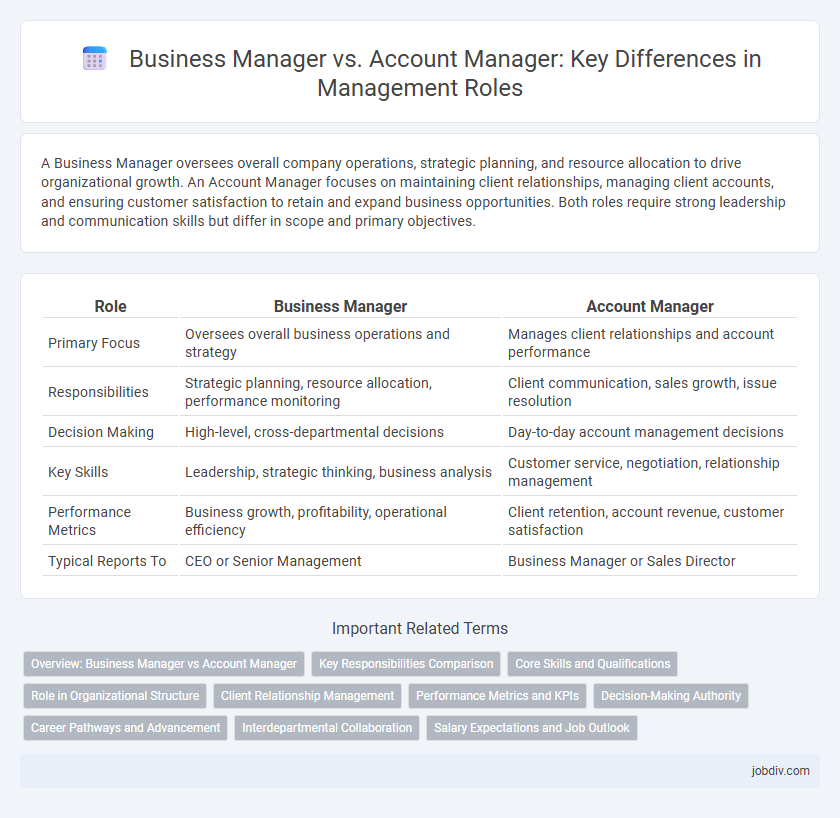A Business Manager oversees overall company operations, strategic planning, and resource allocation to drive organizational growth. An Account Manager focuses on maintaining client relationships, managing client accounts, and ensuring customer satisfaction to retain and expand business opportunities. Both roles require strong leadership and communication skills but differ in scope and primary objectives.
Table of Comparison
| Role | Business Manager | Account Manager |
|---|---|---|
| Primary Focus | Oversees overall business operations and strategy | Manages client relationships and account performance |
| Responsibilities | Strategic planning, resource allocation, performance monitoring | Client communication, sales growth, issue resolution |
| Decision Making | High-level, cross-departmental decisions | Day-to-day account management decisions |
| Key Skills | Leadership, strategic thinking, business analysis | Customer service, negotiation, relationship management |
| Performance Metrics | Business growth, profitability, operational efficiency | Client retention, account revenue, customer satisfaction |
| Typical Reports To | CEO or Senior Management | Business Manager or Sales Director |
Overview: Business Manager vs Account Manager
A Business Manager oversees strategic planning, resource allocation, and overall business growth, ensuring alignment with organizational goals. An Account Manager focuses on maintaining client relationships, managing accounts, and driving sales within assigned portfolios. The distinction lies in the Business Manager's broader operational scope versus the Account Manager's client-centric responsibilities.
Key Responsibilities Comparison
Business Managers oversee strategic planning, market analysis, and overall business growth, ensuring alignment with company goals and stakeholder expectations. Account Managers focus on client relationship management, handling day-to-day communications, and ensuring customer satisfaction and retention through personalized service. The key distinction lies in Business Managers' broad operational duties versus Account Managers' specialized focus on individual client accounts and revenue generation.
Core Skills and Qualifications
Business Managers require strategic planning, financial acumen, and leadership skills to drive overall company growth and operational efficiency. Account Managers must excel in client relationship management, communication, and problem-solving to maintain customer satisfaction and ensure service delivery. Both roles demand strong organizational abilities and proficiency in project management tools to coordinate tasks effectively.
Role in Organizational Structure
A Business Manager typically oversees multiple departments or business units, aligning strategies to achieve overall company goals and often reporting directly to executive leadership. An Account Manager focuses on managing client relationships and ensuring customer satisfaction within specific accounts, acting as the liaison between the client and various internal teams. In organizational structure, Business Managers hold broader responsibilities with strategic influence, while Account Managers have a more specialized, client-centered role.
Client Relationship Management
Business Managers oversee overall client portfolios, focusing on strategic growth and long-term partnerships to maximize business opportunities. Account Managers handle day-to-day client interactions, ensuring satisfaction through effective communication and project execution. Strong client relationship management relies on the collaboration between Business Managers driving strategy and Account Managers maintaining operational excellence.
Performance Metrics and KPIs
Business Managers focus on strategic performance metrics such as revenue growth, market share, and overall profitability to drive organizational success. Account Managers prioritize client-specific KPIs including customer satisfaction scores, retention rates, and account revenue growth to maintain and expand client relationships. Both roles require monitoring key performance indicators aligned with their distinct responsibilities to optimize outcomes effectively.
Decision-Making Authority
Business Managers possess broader decision-making authority, overseeing strategic planning, resource allocation, and overall business operations to drive company growth. Account Managers focus on client relationships, making decisions related to client needs, contract terms, and service delivery within predefined organizational guidelines. The distinction lies in the scope, with Business Managers handling high-level, cross-functional decisions and Account Managers managing client-specific operational choices.
Career Pathways and Advancement
Business managers typically advance toward executive roles by developing strategic leadership skills and overseeing company-wide operations, while account managers often progress by deepening client relationships and moving into senior sales or client service positions. Career pathways for business managers emphasize broad organizational impact and cross-functional team leadership, contrasting with account managers' focus on specialized expertise in customer engagement and revenue growth. Advancement in either role requires strong communication abilities, but business managers benefit from strategic decision-making experience, whereas account managers excel by driving customer satisfaction and retention.
Interdepartmental Collaboration
Business Managers drive interdepartmental collaboration by aligning strategic goals across marketing, sales, finance, and operations to ensure cohesive business growth. Account Managers facilitate collaboration primarily between internal teams and clients, coordinating resources across sales, customer service, and product development to meet client needs effectively. Both roles require strong communication skills, but Business Managers emphasize broader organizational integration while Account Managers focus on client-centered coordination.
Salary Expectations and Job Outlook
Business Managers typically earn an average salary ranging from $75,000 to $120,000 annually, with higher pay in industries like finance and technology, while Account Managers usually have salaries between $55,000 and $90,000, depending on experience and client portfolio size. The job outlook for Business Managers is strong, driven by increasing demand for strategic leadership in corporate settings, whereas Account Managers face moderate growth, influenced by the need for client relationship management across various sectors. Both roles offer advancement opportunities, but Business Managers often transition into executive positions more rapidly due to their broader organizational responsibilities.
Business Manager vs Account Manager Infographic

 jobdiv.com
jobdiv.com